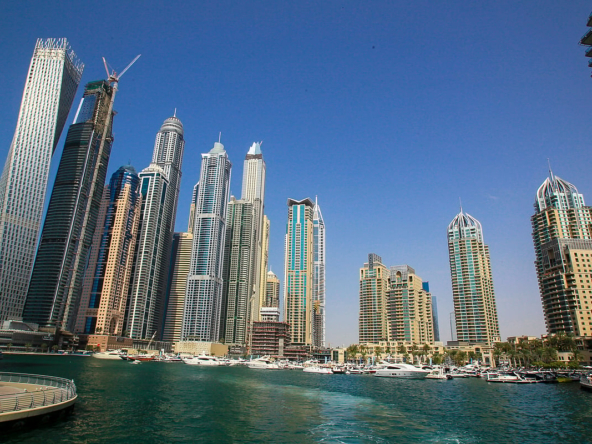Following Dubai Holding’s recent launch of the Dubai Residential REIT IPO on the Dubai Financial Market (DFM), there’s a surge of interest in understanding Real Estate Investment Trusts (REITs) as an accessible and diversified real estate investment solution.
This IPO marks a significant milestone as it is the first REIT to be listed under the UAE’s newly introduced regulatory framework announced in April 2024. This article explores everything you need to know about REITs, the Dubai Residential REIT, and what investors should expect.
🏢 What is a REIT?
A Real Estate Investment Trust (REIT) is a company or fund that invests in income-producing real estate. REITs pool funds from multiple investors to acquire, operate, and manage a portfolio of real estate properties. The income generated is distributed to investors primarily through dividends.
REITs are structured to offer:
-
Consistent income from rental revenues.
-
Capital appreciation as property values rise.
This model allows investors to benefit from real estate income without directly owning or managing the properties.
🏘️ Dubai Residential REIT IPO: Key Highlights
📈 IPO Timeline
-
Subscription Period: May 13–20, 2025
-
Expected Trading Date: Around May 28, 2025
-
Ticker Symbol: DUBAIRESI
-
Listed On: Dubai Financial Market (DFM)
-
Offering Size: 1.625 billion units (12.5% of total)
-
Minimum Allocation: 2,000 units (retail subscribers)
-
Trading Hours: Sunday to Thursday (DFM trading hours)
🏗️ Portfolio Overview
The REIT controls 35,700 residential units across 21 communities, with a total gross asset value (GAV) of AED 21.63 billion, making it the largest listed REIT in the GCC.
🔢 Performance Metrics
-
Occupancy Rate: 97% (2024), up from 93% in 2022
-
Tenant Retention: 87%
-
Average Revenue/Unit: AED 50,315 (up from AED 42,620 in 2022)
-
Tenant Composition: 57% individuals (mostly families), 43% corporate clients

🏠 Property Categories
-
Premium Properties (746 units): Bluewaters Residences, City Walk Residences, Nad Al Sheba Villas.
-
Community Properties (13,649 units): Garden View Villas, The Gardens, Remraam, Meydan Residence.
-
Affordable Housing (16,256 units): Al Khail Gate, International City.
-
Corporate Housing (5,049 units): Nuzul, Al Quoz (staff accommodation).
📜 UAE REIT Regulations (Updated 2024)
⚖️ Key Regulations by SCA
-
Mandatory 80% dividend payout of annual net profits
-
Corporate tax exemption for REITs
-
Tax-free dividends and gains for UAE-based individual investors
-
Shariah compliance (where required)
-
Professional standards in management and oversight
🛡️ Oversight Includes
-
Regular reporting and independent valuations (twice yearly)
-
Transparent fee structures
-
Strong governance framework
💸 Dividend Policy
-
Semi-annual distributions (April & September)
-
First Payment: September 2025
-
Expected Distribution: Higher of AED 1.1 billion or 80% of 2025 profits
-
Commitment: At least 80% of profit distributed annually
🧭 Investment Guide for UAE Investors
🧑💼 For Retail Investors
-
Hold a National Investor Number (NIN)
-
Open a trading account with an authorized broker
-
Subscribe between May 13–20, 2025
-
Minimum guaranteed allocation: 2,000 units
-
Follow broker’s payment steps
-
Receive unit allocation confirmation
-
Start trading once listed
🏢 For Institutional Investors
-
Reserved for Professional Investors under SCA Decision No.13/R.M of 2021
-
Subject to UAE laws and Regulation S (for international institutions)
🧾 Brokerage Requirements
Investors must use:
-
SCA-licensed UAE brokerage firms
-
International firms with UAE operations
-
UAE-based banks offering trading services
💼 Costs and Fees
Though specific costs for this REIT are not disclosed, typical REIT fees include:
-
Management fees (to DHAM REIT Management LLC)
-
Operating and administrative expenses
-
Brokerage commissions
REITs benefit from economies of scale, offering lower costs per unit compared to direct property investments.

🏦 Tax Implications
✅ For UAE Residents
-
Individuals: No tax on dividends or capital gains
-
Corporates: Subject to UAE Corporate Income Tax where applicable
-
REITs: Exempt from corporate income tax
🌍 For Non-UAE Residents
-
Varies by home country
-
May incur withholding taxes
-
Should assess double taxation treaties
-
Seek professional tax advice
⚠️ Risk Factors
-
Vacancy Risk: Due to tenant fluctuations in certain areas
-
Property Value Risk: Affected by market and economic trends
-
Interest Rate Sensitivity: Affects borrowing costs and REIT values
-
Liquidity Constraints: May be limited during market downturns
-
Operational Risk: Dependent on quality of REIT management
-
Regulatory Risks: Changes in rules, taxation, or compliance can affect returns
-
Currency Risk: Relevant for international investors
-
Market Volatility: Can cause REIT unit prices to fluctuate
🆚 REITs vs. Direct Property Investment
| Feature | Direct Property | REIT |
|---|---|---|
| Capital Requirement | AED 500,000+ | Much lower (unit price based) |
| Leverage | Buyer-arranged | Built-in |
| Liquidity | 30–90 days | Instant (market hours) |
| Management | Self-managed | Professionally managed |
| Time Commitment | High | Low |
| Transaction Costs | Higher | Lower |
| Returns | Rental income & appreciation | Dividends + appreciation |
👨💼 Management Team
-
Malek Al Malek: Group CEO, Dubai Holding Asset Management & Chairman of Investment Committee
-
Ahmed Al Suwaidi: Managing Director, DHAM REIT Management LLC
-
Amit Kaushal: Group CEO, Dubai Holding
Together, they bring over 20 years of experience in Dubai’s residential real estate market.
🌆 Market Outlook
Dubai’s property market has seen steady growth driven by strong economic and demographic factors. Between 2018–2023, Dubai’s population grew at 2.7% per annum, fueling housing demand. Major initiatives like the Dubai 2040 Urban Master Plan and the D33 Economic Agenda are expected to double the city’s economy by 2033, enhancing long-term investor confidence.
Dubai Residential REIT is positioned to become the largest listed REIT in the GCC, nearly doubling the size of the region’s next five largest REITs. It also introduces the first pure-play residential leasing REIT in the GCC.
Future trends may include:
-
Sector-specific REITs (commercial, hospitality, industrial)
-
Higher institutional involvement
-
More diversified REIT structures
☪️ Shariah Compliance
Dubai Residential REIT adheres to Shariah principles via:
-
Endorsement by its Shariah Supervision Committee
-
Additional fatwa from Emirates NBD’s Shariah Board
-
Ongoing compliance monitoring
📚 Resources & Professional Help
To ensure a well-informed investment, consider consulting:
-
Licensed UAE financial advisors
-
Islamic finance experts (for Shariah compliance)
-
Tax consultants with international expertise
-
Real estate investment professionals
Useful Links:
-
SCA Website – For investor guidelines
-
Dubai Financial Market – Trading information
-
Dubai Holding – Corporate updates
📈 Investment Strategy Tips
💼 Portfolio Allocation
-
Suggested real estate allocation: 5–15% of portfolio
-
Diversify across asset classes (stocks, bonds, cash)
-
REITs offer income & diversification benefits
📊 Ideal For
-
Investors seeking steady income
-
Inflation-hedging assets
-
Real estate exposure without direct ownership
🧠 Glossary of Key Terms
-
GAV: Total market value of REIT’s properties
-
NAV: Assets minus liabilities (book value)
-
Occupancy Rate: Percentage of rented units
-
Yield: Annual dividend as % of unit price
-
Retention Rate: Percentage of tenants who renew
-
EBITDA: Earnings before interest, tax, depreciation
-
Professional Investor: Qualified per SCA regulations
🔚 Final Thoughts: A Landmark REIT in the UAE
The Dubai Residential REIT signals a new chapter in the UAE’s capital markets. With tax advantages, mandated income distribution, professional asset management, and strong market fundamentals, it’s a compelling option for real estate investors seeking liquidity, simplicity, and diversification.
As the market matures, expect more REIT listings, sector-focused funds, and rising investor engagement—paving the way for a more dynamic and accessible real estate investment ecosystem in the UAE.




